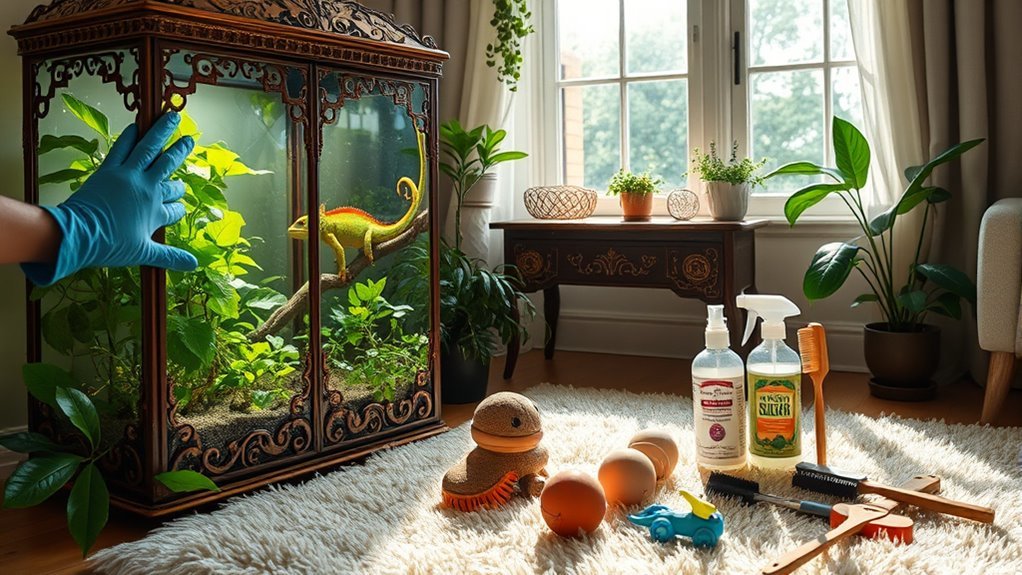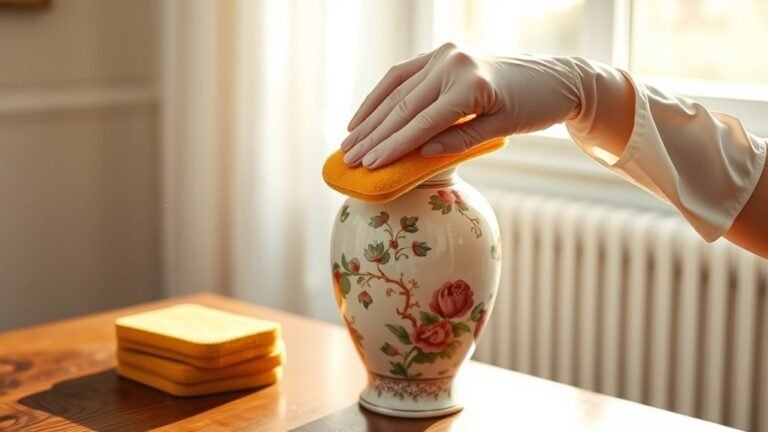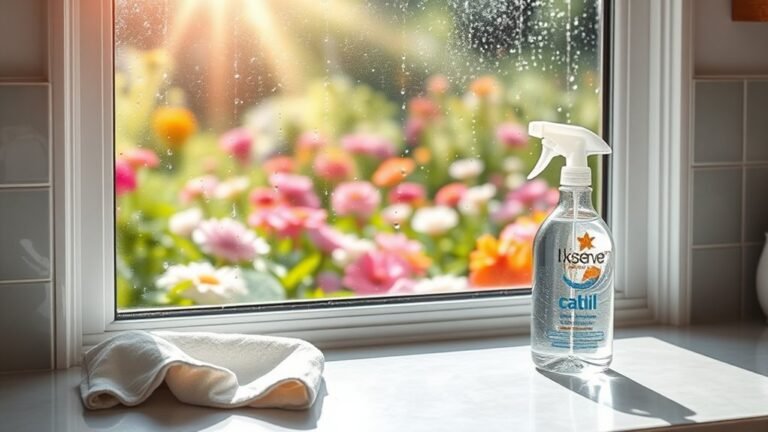Cleaning Tips for Homes With Exotic Pets
Caring for exotic pets means tailoring your cleaning routines to their unique needs. Use pet-safe, natural cleaners like vinegar or baking soda, and invest in specialized tools for bedding and enclosure upkeep. Spot-clean daily and replace substrates regularly to control odors. Handle waste responsibly with eco-friendly disposal methods, and adjust your schedule based on your pet’s habits. If you want to keep your exotic companions healthy and your home fresh, there’s more you can apply from expert tips ahead.
Understanding the Unique Cleaning Needs of Exotic Pets
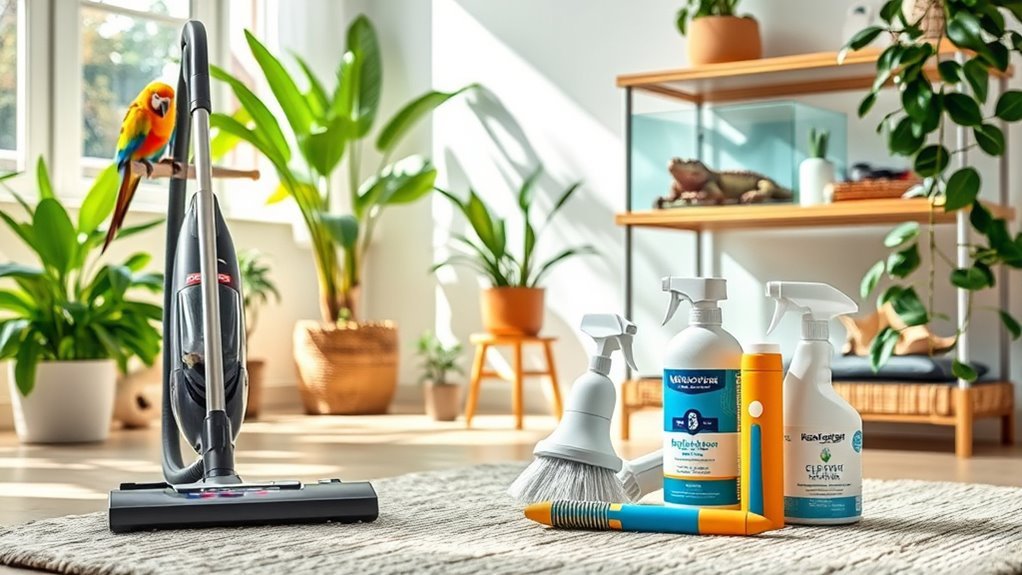
Because exotic pets have diverse habitats and behaviors, their cleaning needs differ considerably from those of common household pets. When you welcome an exotic companion, you embrace unique cleaning challenges tied to their natural instincts and environments. Understanding exotic pet behaviors is key—you’ll notice some species produce more waste, while others require specific humidity or substrate changes to stay healthy. You can’t treat their spaces like a typical dog or cat’s; their enclosures often need tailored care to prevent odors, mold, or bacterial buildup. By recognizing these differences, you gain freedom to create a clean, safe habitat that respects your pet’s nature without confining your lifestyle. Mastering these cleaning challenges lets you enjoy your exotic friend’s wild spirit while maintaining a fresh home.
Essential Cleaning Supplies for Exotic Pet Owners
Having the right cleaning supplies makes maintaining your exotic pet’s habitat much easier and more effective. You’ll want to invest in exotic pet specific tools like specialized scoops, brushes, and habitat-safe scrapers that cater to your pet’s unique environment. These tools help you clean thoroughly without causing stress or harm to your animal. Also, consider cleaning product alternatives that are natural and non-toxic; they’ll keep your pet’s space fresh without exposing them to harsh chemicals. Vinegar, baking soda, and diluted essential oils can be great options, letting you maintain cleanliness while embracing a more liberated, eco-friendly approach. By choosing the right supplies, you gain freedom from worry, knowing you’re protecting your pet’s health and comfort every step of the way.
Daily Cleaning Routines to Keep Odors at Bay
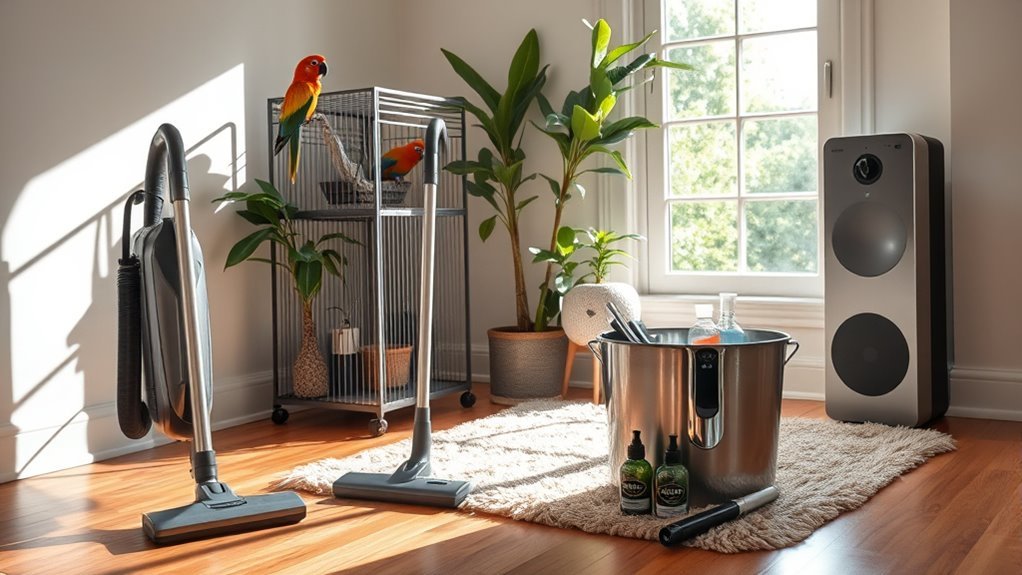
Selecting the right cleaning supplies sets the stage for effective daily maintenance that keeps odors from lingering in your exotic pet’s space. To maintain freshness, incorporate daily air freshening by opening windows or using pet-safe sprays, allowing your home to breathe freely. Routine surface sanitizing is essential—wipe down cages, perches, and feeding areas with gentle disinfectants to eliminate odor-causing bacteria without harsh chemicals. Focus on high-contact spots to prevent buildup. Staying consistent with these habits empowers you to enjoy your pet’s presence without being overwhelmed by smells. Remember, your daily commitment to cleanliness supports both your freedom to live comfortably and your exotic companion’s health. By keeping your space fresh and sanitized, you create a harmonious environment where both you and your pet thrive.
Managing Bedding and Substrate Effectively
When you manage bedding and substrate effectively, you not only control odors but also create a healthier environment for your exotic pet. Choosing the right bedding materials and substrate types is key to keeping your pet comfortable and your space fresh. Remember, different pets thrive on specific substrates, so pick what suits their natural habitat. To make maintenance easier and maintain freedom in your routine, keep these tips in mind:
Effective bedding management controls odors and creates a healthier, more comfortable space for your exotic pet.
- Regularly spot-clean bedding to remove waste and moisture.
- Replace bedding materials fully every 1-2 weeks to prevent buildup.
- Use substrate types that are absorbent yet easy to change, like coconut fiber or paper-based products.
- Avoid mixing incompatible bedding materials to prevent mold or pests.
Safe Disinfectants and Cleaning Agents for Exotic Enclosures

Maintaining a clean environment goes beyond managing bedding and substrate—you’ll also want to focus on the disinfectants and cleaning agents you use for your exotic pet’s enclosure. Choosing safe cleaning products is crucial to protect your pet’s health and maintain a toxin-free space. Harsh chemicals can cause stress or harm, so consider disinfectant alternatives like diluted vinegar, hydrogen peroxide, or eco-friendly cleaners specifically designed for reptile or amphibian habitats. These options effectively eliminate bacteria without leaving dangerous residues. Always rinse surfaces thoroughly after cleaning to guarantee no harmful substances remain. By opting for safe cleaning methods, you create a healthier environment that respects your pet’s unique needs and your desire for a safe, free-living space, where both of you can thrive without unnecessary risks.
Handling Waste Disposal Responsibly
When handling exotic pet waste, you’ll want to separate it properly to avoid contamination and control odors effectively. Using techniques like regular cleaning and natural deodorizers can keep your home smelling fresh. Plus, choosing eco-friendly disposal methods helps protect the environment while managing your pet’s waste responsibly.
Safe Waste Segregation
Properly sorting your exotic pet’s waste is essential for both hygiene and safety. When you practice effective waste separation, you minimize health risks for you and your pet while keeping your space fresh and safe. Embrace composting options for organic waste like plant-based bedding or uneaten veggies to reduce landfill impact and create nutrient-rich soil. Here’s how you can stay on top of it:
- Use separate bins for organic and non-organic pet waste.
- Label containers clearly to avoid mixing hazardous materials.
- Store waste containers in well-ventilated areas to prevent buildup.
- Regularly clean bins to discourage pests and odors.
Odor Control Techniques
After sorting your exotic pet’s waste carefully, controlling odors becomes the next step in keeping your home comfortable and clean. You can rely on natural deodorizing methods like baking soda or activated charcoal, which neutralize smells without harsh chemicals. Pet friendly air fresheners are also great for maintaining a fresh environment while respecting your pet’s health.
| Method | Benefits | Tips for Use |
|---|---|---|
| Baking Soda | Absorbs odors naturally | Sprinkle in litter areas |
| Activated Charcoal | Long-lasting odor control | Use in breathable pouches |
| Essential Oils* | Pleasant scent, natural | Use diluted; avoid toxicity |
| Pet Friendly Air Fresheners | Safe, easy application | Spray in well-ventilated spots |
| Vinegar Solution | Neutralizes urine odors | Wipe surfaces, avoid strong smells |
*Check pet safety before use.
Eco-Friendly Disposal Methods
Although managing your exotic pet’s waste can be challenging, choosing eco-friendly disposal methods helps protect the environment and keeps your home hygienic. You want solutions that give you freedom without guilt. Start by using biodegradable bags for collecting waste—they break down naturally and lessen landfill impact. Composting waste, if safe for your pet’s specific type, is another excellent way to recycle nutrients back into your garden. Here are some responsible options to evaluate:
- Use biodegradable bags for daily waste collection
- Set up a dedicated compost bin for suitable pet waste
- Dispose of non-compostable waste at designated eco-friendly facilities
- Regularly clean and disinfect waste containers to prevent contamination
Tips for Cleaning Bird Cages and Aviaries
Keeping bird cages and aviaries clean is essential for your pet’s health and comfort. You want to create a space where your feathered friends can thrive freely, so regular cage maintenance is a must. Start by removing food debris, droppings, and feathers daily to prevent bacteria buildup. Weekly, take the time to deep clean using bird-safe disinfectants, rinsing thoroughly to avoid harmful residues. For aviary hygiene, guarantee proper ventilation and sunlight, which help reduce moisture and mold growth. Replace bedding and perches often, and scrub toys to keep germs at bay. By committing to these straightforward steps, you’ll provide a fresh, safe environment that supports your birds’ natural behaviors and well-being, letting them enjoy their freedom fully.
Maintaining Reptile Terrariums for Optimal Hygiene
When you care for reptiles, maintaining a clean terrarium is crucial for their health and comfort. Proper terrarium maintenance keeps your pet’s environment fresh and reduces harmful bacteria buildup. Start by choosing the right substrate selection—it should absorb waste well and be easy to replace. Regular spot cleaning removes waste daily, while full substrate changes prevent odor and mold. Don’t forget to disinfect water bowls and decorations frequently to avoid contamination.
Maintaining a clean terrarium is essential for your reptile’s health, comfort, and a fresh, bacteria-free environment.
- Choose a substrate that suits your reptile’s needs and is easy to clean
- Spot clean daily to remove droppings and leftover food
- Replace substrate completely every few weeks
- Disinfect water dishes and decor to maintain hygiene
Taking these steps guarantees your reptile enjoys a clean, healthy space that supports their freedom and well-being.
Creating a Cleaning Schedule That Works for You and Your Pets
When setting up your cleaning schedule, make sure to choose pet-safe products to keep your exotic friends healthy. Find a balance between how often you clean and how thorough each session needs to be. This way, you’ll maintain a safe environment without overwhelming yourself or stressing your pets.
Prioritize Pet-Safe Products
Although it might be tempting to use strong cleaners for a quick fix, you’ll want to prioritize pet-safe products to protect your exotic pets’ health. Harsh chemicals can cause respiratory issues or skin irritation, limiting your pet’s freedom to explore safely. Instead, opt for pet safe cleaners or natural alternatives that clean effectively without harmful residues.
Here’s how you can keep your space clean and safe:
- Choose plant-based, non-toxic cleaning products.
- Avoid ammonia, bleach, and artificial fragrances.
- Use vinegar or baking soda for natural stain removal.
- Test new products in small areas before full use.
Balance Frequency and Thoroughness
Since exotic pets often have unique needs, you’ll want to find a cleaning routine that keeps their environment safe without overwhelming you. Striking the right cleaning frequency and thoroughness balance is key. Too frequent cleanings might stress your pet or consume your free time, while too infrequent could lead to health hazards. Start by evaluating your pet’s habits and environment—some species require daily spot cleaning, while others thrive with weekly deep cleans. Create a flexible schedule that fits your lifestyle, allowing adjustments as needed. Remember, consistency matters more than perfection; maintaining a manageable routine guarantees you protect your pet’s health and enjoy your time together without feeling trapped by chores. Find that sweet spot where your cleaning frequency supports both safety and your freedom.
Frequently Asked Questions
How Do I Prevent Cross-Contamination Between Exotic Pet Areas and Living Spaces?
To prevent cross-contamination, you’ll want to set up dedicated quarantine zones for your exotic pets, keeping their areas completely separate from your living spaces. Make sure to practice thorough surface sanitization regularly, especially on shared tools or hands after handling your pets. This way, you’ll maintain a clean, safe environment without feeling restricted, giving you the freedom to enjoy both your home and your exotic companions worry-free.
What Are the Best Practices for Cleaning After Exotic Pet Grooming?
Think of your grooming supplies and cleaning tools as the guardians of your pet’s freedom, sweeping away the remnants of their wild spirit without trapping it. After grooming, you’ll want to disinfect brushes, combs, and scissors promptly to prevent bacteria buildup. Clean surfaces with pet-safe cleaners, and wash towels thoroughly. By caring for your tools and space, you keep your pet’s world clean and free, letting their unique energy roam unhindered.
Can Cleaning Routines Affect My Exotic Pet’S Behavior or Stress Levels?
Yes, your cleaning frequency can definitely impact your exotic pet’s behavior and stress levels. Since many exotic pets have high pet sensitivity, sudden or intense cleaning might make them anxious or stressed. You’ll want to find a balance that keeps their environment clean without overwhelming them. By adjusting how often and how you clean, you’ll help your pet feel more relaxed, giving both of you the freedom to enjoy a harmonious space.
How Often Should I Deep Clean My Exotic Pet’S Toys and Accessories?
You should stick to a regular toy sanitization schedule to keep your pet’s environment healthy and stress-free. Generally, deep cleaning toys and accessories once every one to two weeks works well. However, if your pet’s toys get dirty faster or if your exotic friend’s health demands extra care, you might want to increase the accessory maintenance frequency. Staying consistent lets you enjoy freedom from worries about germs without overdoing it.
Are There Any Natural Cleaning Alternatives Safe for Exotic Pets?
Looking for natural disinfectants that keep your pet’s space truly safe? You’re in luck! Vinegar and diluted hydrogen peroxide are gentle yet effective options that won’t harm safe surfaces or your exotic friend. They clean without harsh chemicals, giving you peace of mind and freedom from worry. Just remember to rinse well and avoid essential oils, which can be toxic. With these natural choices, you’re caring boldly and responsibly.
